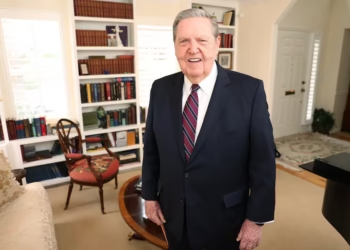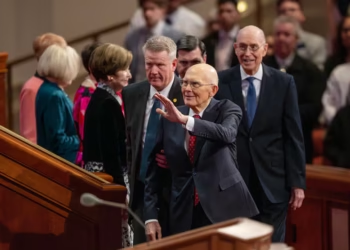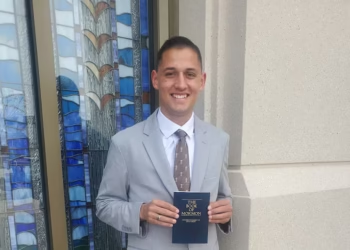Richard E. Turley Jr., a former assistant church historian and recorder, has been given a commission by the First Presidency of The Church of Jesus Christ of Latter-day Saints to write a new biography of the Prophet Joseph Smith. The title of the book will be “Joseph the Prophet.”
President Dallin H. Oaks of the First Presidency made the announcement at the end of his keynote remarks at the seventh annual Joseph Smith Papers conference in the Conference Center Theater in Salt Lake City on Friday, September 15, 2023.
“With the completion of the Joseph Smith Papers [in June 2023], a firm foundation has been laid on which additional works can be solidly built,” President Oaks said.
The new biography will take years to complete. Teams aiding on the project include Church History Department scholars, including many who worked on the Joseph Smith Papers volumes and who collectively have already devoted decades of study to the Prophet. Staff and volunteers of the Family History Department are also contributing their skills in local research and building databases to help answer important questions. Professors from BYU have joined seasoned legal scholars and interns from the J. Reuben Clark Law School to study the legal papers of Joseph Smith and his family.
The biography will rely on the research of these and other scholars, who are expected to generate a number of publications with detailed findings on which the biography can then rely. The biography itself will be written as a narrative for a general audience and is expected to garner a wide readership.
Turley, who has written more than 20 books, served as the managing director of the Church Historical Department (as it was then called) when the Joseph Smith Papers were launched in June 2001 and served as chair of the project’s editorial board, as well as a volume editor. He was managing director of the Family History Department when FamilySearch was launched and later served as managing director of the Church’s Public Affairs and Communication Departments.
President Oaks, who served for 20 years as an apostolic advisor in Church history matters, spoke at length in his keynote address on the origins of the Joseph Smith Papers project, which makes this new biography possible.
“The work on what eventually became the Joseph Smith Papers really began when the Church was organized on April 6, 1830,” the First Counselor in the First Presidency said. “That day, the Lord gave a revelation to the Prophet in which He commanded him to keep a record. As a boy, Joseph Smith had not done so. His formal education was limited, paper was expensive and it was not customary for poor farm boys in the United States to keep journals. That is why we lack contemporaneous accounts of his earliest visions.”
Though the Prophet made many efforts during his life to keep records, his history was far from finished when he was martyred on June 27, 1844. Other efforts were valuable but limited. Assistant Church Historian B.H. Roberts began publishing what is sometimes called the Documentary History of the Church in 1902. And Dean C. Jessee, a scholar at Brigham Young University (BYU), published two volumes of “The Papers of Joseph Smith” in 1989 and 1992.
Over time, officials from the Church and BYU began discussing how to work together to fulfill the ambitious vision to publish the papers of the founding prophet of The Church of Jesus Christ of Latter-day Saints. Three things were needed: 1) to gather the Prophet’s papers, some of which were scattered in institutional and private collections; 2) to assemble scholars with subject matter expertise on Joseph Smith and the time period in which he lived; and, perhaps most difficult, 3) to procure substantial funding.

“It was a generous couple willing to heed spiritual promptings that provided the key to catapulting the project forward on a grand scale,” President Oaks said. “They were Larry H. and Gail Miller, prominent Utah philanthropists who owned an automobile sales empire and the Utah Jazz basketball team, among other enterprises.”
The Millers viewed historical documents at Church headquarters in January 2001 and were deeply moved. After discussions with officials from the Church Historical Department and BYU, the Millers agreed to give tens of millions of dollars to fund the Joseph Smith Papers project.
“The Millers’ inspired decision resolved the final issue in making the expanded papers project a reality,” President Oaks said. “A few weeks later, on April 19, 2001, the Council of the First Presidency and Quorum of the Twelve Apostles approved the newly expanded project, and on June 28, 2001, a meeting was held in the administration building at BYU to formally launch the new and expanded Joseph Smith Papers project.”
The first volume was published in 2008. The remaining 26 volumes were eventually published at a rate of two per year, “an unheard-of pace for documentary editions,” President Oaks said. “No other documentary editing project can match this record of high-quality volumes produced in such a short period of time.”
The Church of Jesus Christ has already benefited from the papers. In 2013, the faith made changes to the contextual information in more than half of the section headings of the Doctrine and Covenants thanks to what was learned. More recently, the first volume of ‘Saints,’ the Church’s new multivolume history, brings many of the insights of the Joseph Smith Papers to 1 million-plus readers of that book in 14 languages.
President Oaks concluded his address with a tender experience Larry Miller had with American opera singer Michael Ballam.
“Shortly before Larry Miller’s death in 2009, Michael and his son Ben visited Larry in the hospital. During that visit,” President Oaks said, “Larry asked them to sing the last verse of ‘Praise to the Man,’ a hymn of tribute written after the Prophet’s martyrdom that concludes with the words ‘millions shall know Brother Joseph again.’ After they sang it, Larry asked them to sing it again, but to change the word ‘millions’ to ‘billions shall know Brother Joseph again.’ They sang that, and tears flowed down Larry’s cheeks. With the project now concluding, the groundwork has been laid for those hopeful words to become a reality.”
















Discussion about this post